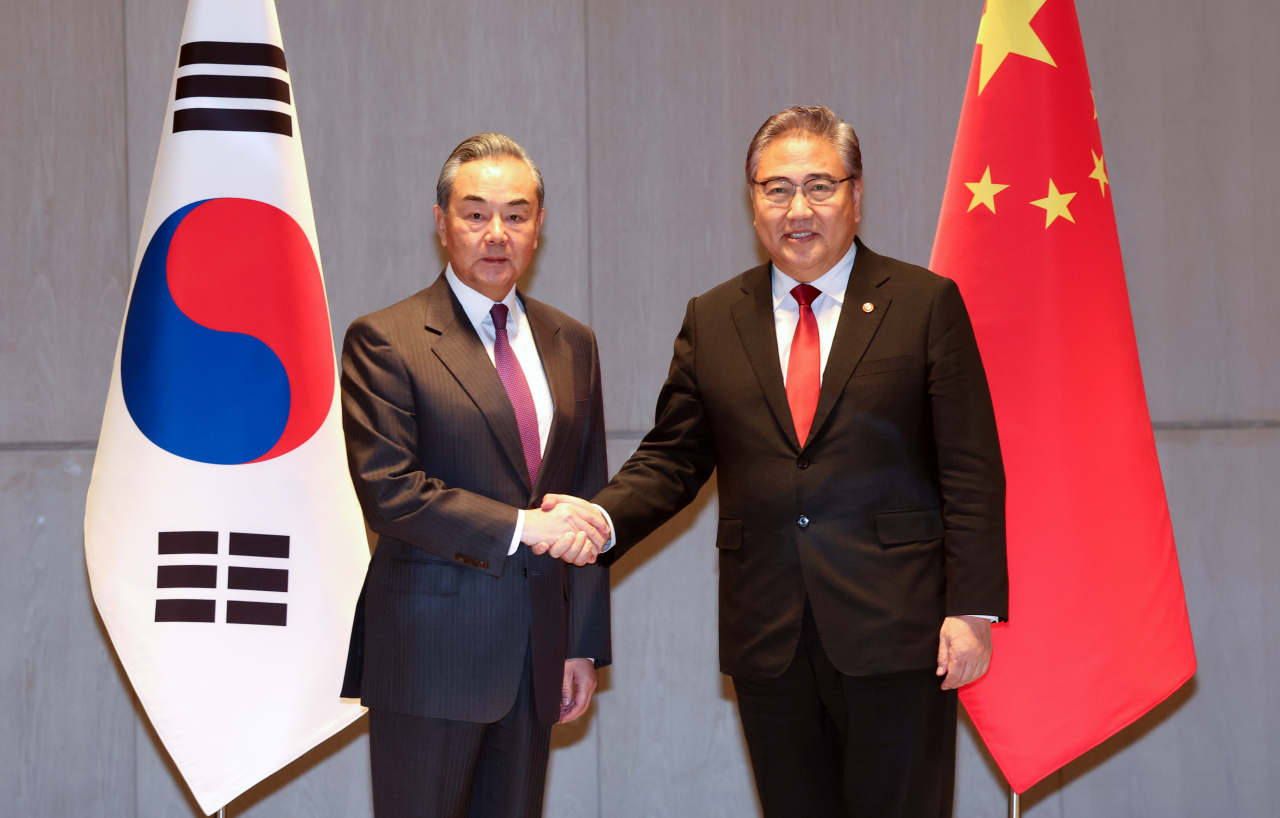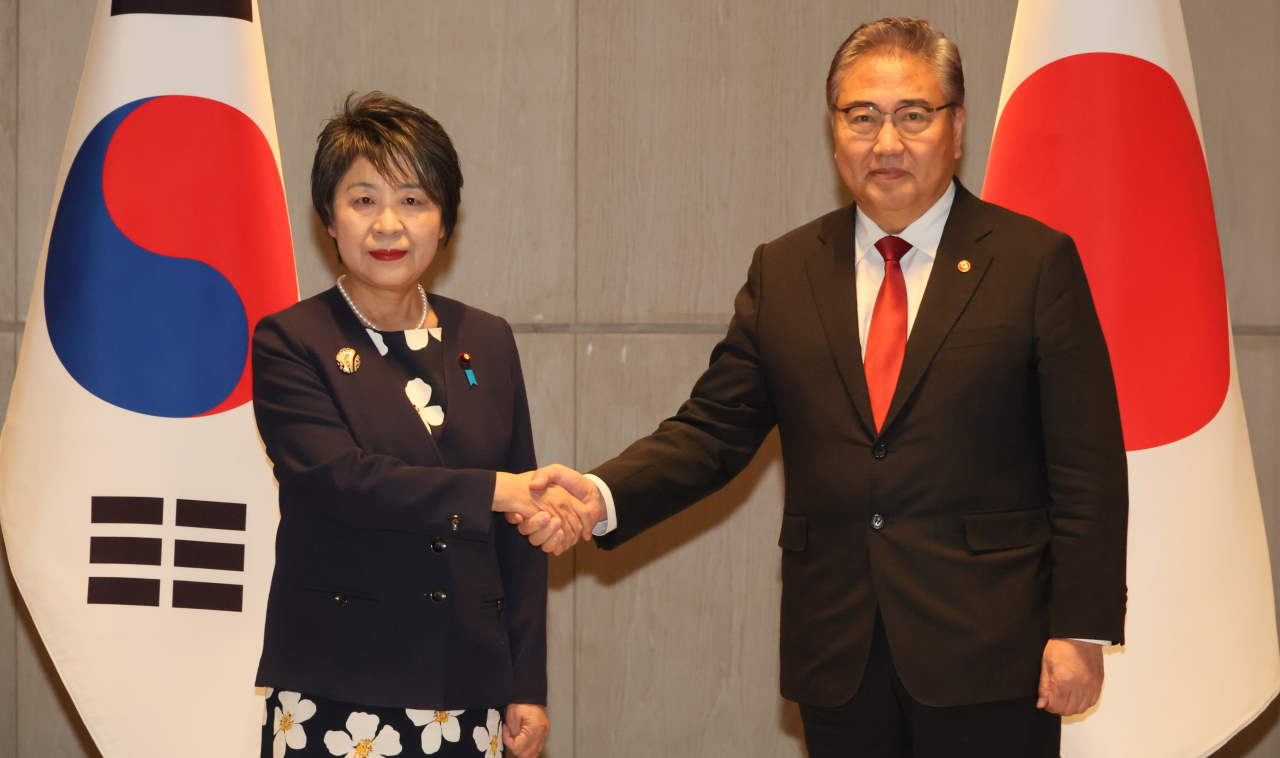 |
Foreign Minister Park Jin (right) shakes hands with Chinese Foreign Minister Wang Yi ahead of their bilateral talks in Busan on Sunday, the venue for a trilateral gathering with their Japanese counterpart, Yoko Kamikawa. (Yonhap) |
BUSAN -- China's top diplomat Wang Yi expressed concerns over intensifying tension on Korean Peninsula and said that China will play a role in stabilizing the situation during a meeting with his South Korean counterpart Park Jin, the Foreign Ministry said Sunday.
The two also agreed to reinforce high-level and strategic communications for reciprocal visits between the foreign ministers and the potential visit of Chinese President Xi Jinping to South Korea, at a meeting held on the sidelines of the trilateral ministerial meeting of South Korea, Japan and China later in the afternoon.
Park told Wang about the validity of South Korea's choice to suspend the implementation of the no-fly zone clause in the 2018 inter-Korean military agreement. This decision was made in response to North Korea's launch of a purported military spy satellite.
But a senior official of the ministry said that Wang's remarks on China's role in assisting in the stabilization of the peninsula appeared to be repeating its previous stance on the matter, rather than being interpreted as a change in stance.
The meeting between foreign ministers was held after a highly anticipated summit between South Korean President Yoon Suk Yeol and Xi fell through at the Asia-Pacific Economic Cooperation summit in San Francisco earlier this month.
"Both sides affirmed their commitment to bolster strategic communications across various levels, including the Foreign and Defense Meeting, the Strategic Dialogue between Vice Foreign Ministers, and the Track 1.5 Dialogue," according to South Korea's Foreign Ministry.
During the meeting, Wang extended an official invitation to Park to visit China as part of these collaborative efforts, a senior official at the Foreign Ministry -- who wished to remain anonymous -- said during a closed-door briefing following the meeting. The Foreign Ministry interprets Wang's visit to Busan as reciprocal to Park's trip to Qingdao, China, in August last year.
The two sides discussed Xi's potential visit to South Korea, an official who requested to be unnamed said, without clarifying whether they reached a consensus on the matter.
"The matter of President Xi Jinping's visit was discussed, and both sides acknowledge the significance of high-level exchanges, maintaining an ongoing dialogue," the official said.
"While a specific timeline remains undecided, discussions on this matter are taking place. Within the meeting, there was a fundamental exchange of viewpoints, underscoring the importance of high-level exchanges and effective communication."
Since President Xi's state visit in July 2014 during the Park Geun-hye administration, almost a decade has passed without another visit to South Korea. In contrast, former South Korean President Moon Jae-in made two visits to China during his term, in 2017 and 2019. This has led to a growing sentiment within the South Korean government that it is now China's turn to reciprocate.
During the meeting, Park and Wang also touched upon sensitive issues, including the Taiwan issue and the forced repatriation of North Korean defectors in China.
 |
Foreign Minister Park Jin (right) shakes hands with Japanese Foreign Minister Yoko Kamikawa ahead of their bilateral talks at a hotel in Busan Monday, where they gathered to hold trilateral talks with their Chinese counterpart, Wang Yi, later in the day. (Yonhap - Pool Photo) |
The South Korean and Japanese top diplomats also had a separate meeting, engaging in in-depth discussions on bilateral ties and mutual interests such as cooperation in advanced technology and addressing various pending issues, including North Korea's latest launch of a purported military reconnaissance satellite, according to South Korea's Foreign Ministry.
Park and his Japanese counterpart Yoko Kamikawa notably discussed the recent ruling of a South Korean court on "comfort women" -- Korea's euphemistically labeled victims of sex slavery during the Colonial Japan period -- a long-standing dispute between the two countries.
Park said the "Yoon Suk Yeol government respects the 2015 agreement between South Korea and Japan on 'comfort women' as the official deal," another senior official at the Foreign Ministry said on condition of anonymity during a closed-door briefing.
Park emphasized the "need for joint efforts to restore the honor and dignity of the victims outlined in the agreement. Additionally, he urged both countries to work toward cultivating constructive and future-oriented relations in the process." the official added.
A South Korean appeals court on Thursday reversed a previous ruling, finding the Japanese government liable for damages to be paid to Korean women forced into wartime brothels during its 1910-45 occupation of the peninsula. The court cited international customary law, asserting Japan's accountability under South Korean jurisdiction and overturning the 2021 dismissal that acknowledged Japan's state immunity.
Kamikawa on Sunday reiterated the Japanese government’s stance on the South Korean court's decision, according to the official.
Kamkawa said Thursday that the court ruling is "clearly contrary to international law and agreements between the two countries, and therefore extremely regrettable and absolutely unacceptable" in a statement.
The Japanese government has consistently asserted that matters related to property and claims were resolved through a 1965 treaty that normalized relations following Seoul's independence from Tokyo in 1945. The 2015 agreement, initially perceived as an effort to find a resolution but currently in a state of suspension, is frequently referenced as a component of that settlement.
The official clarified that Park's remarks were aimed at "sustaining bilateral communications on the matter," refraining from providing further details when questioned about whether Park's comments suggested that victims lacked a legal right to receive compensation for damages.
However, the meeting between Park and Kamikawa was extended to 85 minutes, surpassing the initially scheduled duration by 25 minutes. The senior official clarified that the extended discussion was motivated by a "mutual dedication to fostering a future-oriented and constructive evolution of Korea-Japan relations, while collectively addressing pending issues."
The meeting also coincided with Japan reportedly endorsing Busan's bid for the 2030 World Expo, amid improved bilateral ties, while South Korea makes final efforts toward securing the hosting opportunity.
The selection of the venue for the 2030 Expo will be determined through the anonymous voting of 182 member states during the BIE General Assembly in Paris on Tuesday. Busan is in contention with Riyadh, Saudi Arabia, and Rome, Italy.
The top diplomats of the three countries were set to convene in Busan in the afternoon, aiming to deliberate on a possible date and the agenda for a trilateral summit that has been on hold since 2019.




![[Exclusive] Hyundai Mobis eyes closer ties with BYD](http://res.heraldm.com/phpwas/restmb_idxmake.php?idx=644&simg=/content/image/2024/11/25/20241125050044_0.jpg)
![[Herald Review] 'Gangnam B-Side' combines social realism with masterful suspense, performance](http://res.heraldm.com/phpwas/restmb_idxmake.php?idx=644&simg=/content/image/2024/11/25/20241125050072_0.jpg)

